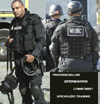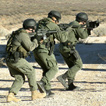Acceptance Contingency:
The tactical
training provided
by Rescue Training is of
a sensitive nature, conducted by law enforcement personnel, and is
provided
only
to
those
that
have
a "need-to-know".
Precautions
are taken to
assure
that
we do not disclose
tactical
operational
information
to
individuals
that
could
potentially
use
this
information
for unlawful purpose.
In order to verify the credibility of
those
that
we
train,
the applicant must
be an EMT and
working
within the public
safety
arena (Police.
Fire,
or
EMS),
the
military, or working within
a division
of the
US Department
of Homeland
Security.
All
applicants
must
provide
verifiable
proof
of EMT training
and
public
safety
employment.
This
is done
by providing
a
copy of your EMT certification
and
a
letter
from
your
employer,
on
official company
letterhead,
verifying
this
fact
and
offering
the
name,
rank,
and contact
phone
number
of
the agency
head
or
authorizing
person
issuing
the
letter.
Final acceptance
into
this
TEMS
Program
is
contingent
upon this
verification
process.

 |
Responsibilities of the Medic
A team medical officer is a
necessary component of every tactical law enforcement team. In this
document, the terms “tactical medic” and “team medical officer” are
used interchangeably and refer to a medical provider assigned to the
team. His functions include:
- Acquiring and
maintaining important medical history, immunization status and
current health status of each team member. The confidentiality
of this information is ensured by the medical officer. He also
ensures the transfer of information to appropriate medical
personnel to save valuable time during the treatment of injury
and illness.
- Developing
appropriate physical fitness, psychological stress prevention,
and self-aid/buddy aid programs for team personnel. Monitoring
the medical effects of environmental conditions on individual
and team performance; including considerations such as sleep
deprivation, nutritional status and heat and cold stress. The
tactical medic immediately brings any problems to the
Commander’s attention.
- Providing
field medical treatment to team members injured or taken ill
while engaged in mission activity. He ensures that team members
are afforded the best possible treatment and are transferred in
a timely manner to an appropriate level of care. He provides
humanitarian medical assistance to non-law enforcement personnel
injured or taken ill during an operation until appropriate
transfer to the EMS system can be safely affected.
- Serving as the
patient advocate for officers who are treated by other medical
providers. He establishes good working relationships with local
EMS systems and with receiving medical institutions and assures
appropriate integration of the team’s medical program with the
local health care delivery system. He also keeps commanding
officers appraised of his findings and recommends actions, which
should be taken to insure optimum outcome for the officer and
the team following injury or illness.
- Conducting
Medical Threat Assessments to determine the potential impact of
medical/health factors on mission outcome and serving as the
Medical Intelligence Officer. He serves as a health information
resource for team members. These functions are an integral part
of the mission planning process. The team medical officer is the
commander’s conscience and advisor on matters relating to the
health of the team.
TACTICAL
COMMANDER RESPONSIBILITIES....
HOME
| TEMS Info
| ABOUT US
| Docs /
Downloads |
Contact |

